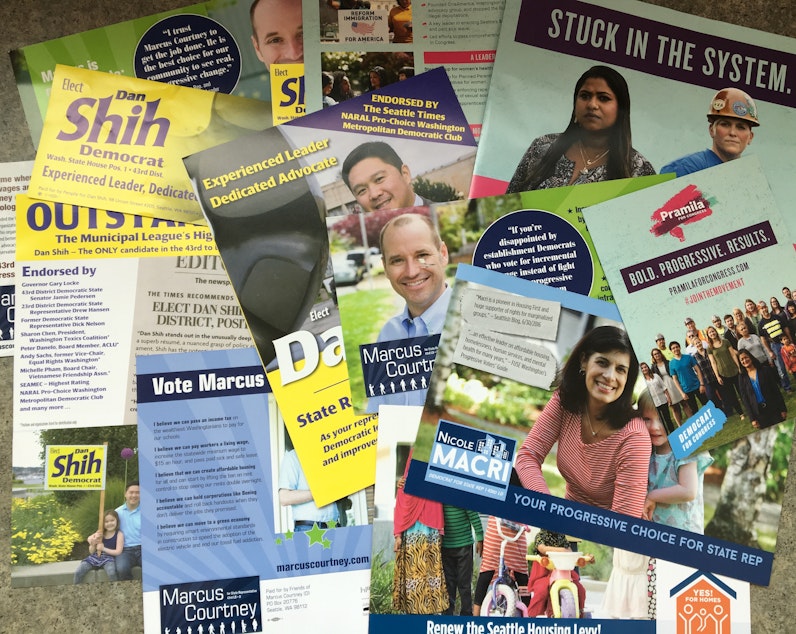Stacks of cash make most Congressional elections no contest

If you look at your voters' pamphlet and see page after page of candidates trying to win your vote, you might think democracy is strong in Washington state. KUOW looked at the money behind the candidates and found there's much less competition — much less democracy — than meets the eye.
Every member of Congress from Washington state who is running for reelection has raised at least 8 times more campaign cash than their nearest challenger.
Money is no guarantee of victory in politics. But when a candidate has 8 times more money than an opponent, the underdog has little hope of winning.
Democratic Senator Patty Murray has amassed $8 million, or 33 times more than her Republican challenger, Chris Vance, according to filings with the Federal Election Commission.
The same pattern holds true for all nine Washington state incumbents working to hold on to their seats in the U.S. House of Representatives.
Democrat Suzan DelBene has reeled in 10 times more money than her Republican challenger, Elizabeth Scott.
Republican Congressman Dave Reichert has raised 23 times more cash than Democrat Jason Ritchie (who has since dropped out of the race to run for the state Legislature) and 46 times more than current challengers, Democrats Santiago Ramos and Alida Skold.
What does all that money tell us?In a nutshell, no one in the Washington delegation, Democrat or Republican, is facing a serious challenge to staying in power."Yeah, it's a problem," Western Washington University political scientist Todd Donovan said."Those ratios, 10 to 1, 100 to 1 — not that unusual," he said. "We live in a world where, in a normal year, 95 percent of House incumbents are going to get reelected. You've got a lot of people who don't have to worry about reelection."Once in a blue moon, a candidate will win even though they were outspent. But in the past decade, according to a KUOW analysis, nobody has made it into Congress from Washington state without raking in at least 65 percent as much cash as their main opponent. So far this year, no challengers are even close.
It's a pattern repeated throughout the country.Nationwide, incumbent candidates for the House of Representatives raised nearly 5 times more money than their challengers between 1998 and 2014, according to the California nonprofit MapLight. The incumbents won re-election 94 percent of the time.Donovan said political scientists debate the causes for such lopsided contests, but people filtering into communities with people like themselves is one reason."It's just really hard to draw maps to create competitive districts where you get a mix of Democrats and Republicans," he said. "Democrats live near Democrats, and Republicans live near Republicans, and that's why we end up with these seats where you get an incumbent from one party running unopposed usually."The nonpartisan Cook Political Report calls 379 of 435 seats in the U.S. House of Representatives "solid" this year, with incumbents expected to win with little trouble. The report considers only 37 seats to be competitive, including the 12 seats where the incumbent is not running. While most members of Congress may not be terribly accountable to the will of the voters, Donovan said they are still accountable to their donors. Each party's leadership requires members of Congress to raise big money, even if their own district is considered "safe.""Your incumbents, even if they don't have a challenger, still have to spend hours a week, if not a day, raising money, to get to those few districts that are actually competitive," Donovan said.Most Congressional incumbents from Washington state have raised $1 million or more so far this year. If you've donated to a Congressional race in Washington state this year, much of your money might end up somewhere else, like Florida or New York.Money from elsewhere is being spent on the one competitive Congressional race here in Washington — the only one without an incumbent. Democratic "Congressman for Life" Jim McDermott of Seattle is retiring after nearly three decades on Capitol Hill and 14 landslide victories in a row.As far as money goes, Washington state Sen. Pramila Jayapal is leading the race to replace the Congressman for Life, with $1.28 million in contributions. Washington state Rep. Brady Walkinshaw has raised $887,000, and King County Council Chair Joe McDermott (no relation to Jim) has brought in $425,000.Contributions from other parts of the country have pushed Jayapal ahead of her fellow Democrats.According to researcher Doug Weber with the Center for Responsive Politics in Washington, D.C., 44 percent of Jayapal’s campaign contributions have come from outside Washington state — more if you count contributions from political action committees, many of which are based in the Washington, D.C., area. Twenty-two percent of Walkinshaw’s contributions have come from outside Washington state, and 12 percent of Joe McDermott’s, according to Weber, who analyzed the latest Federal Election Commission filings on Thursday at KUOW’s request.While Joe McDermott is in a distant third place in the money race, his last name could give him a big advantage if voters instinctively check the McDermott box, as they have for the past 28 years.Clarification 7/29/2016: This story has been updated to include the status of challengers to Rep. Dave Reichert.

